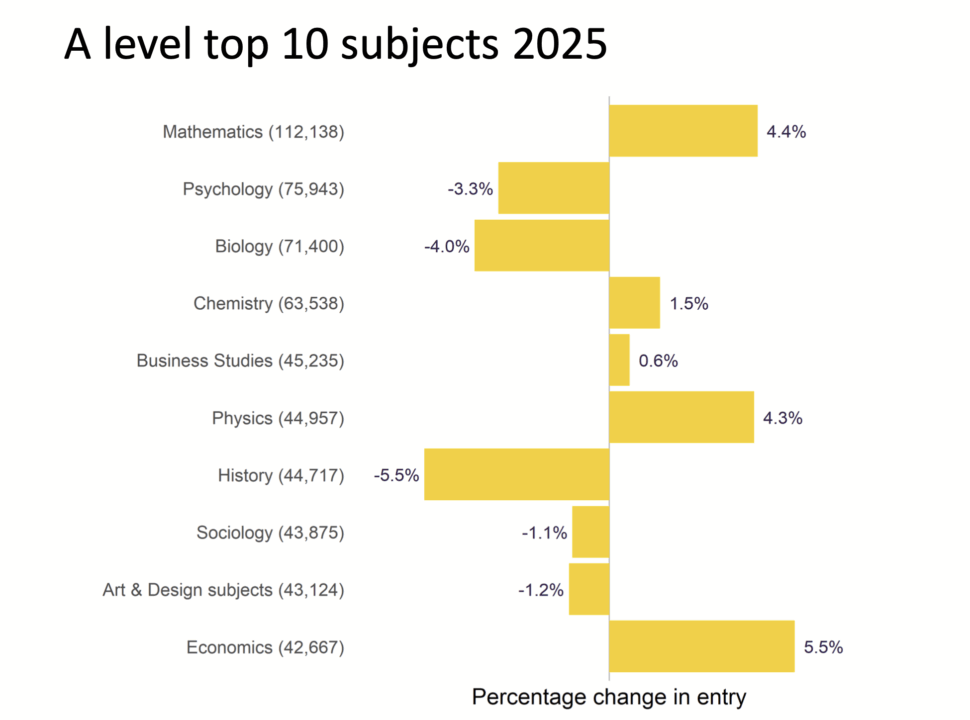Social media influencers could be helping fuel a rise in career-focused subjects such as economics and business studies at A-level, exam board chiefs have said.
Economics registered a 5.5 per cent rise in students this year, the biggest increase amongst the country’s ten most popular subjects.
Meanwhile a rise in entrants at business studies, another career-focused subject, saw it overtake history to become the fifth most popular A-level.
‘Social media influence’
At a results day press briefing this morning, Claire Thomson, executive director of regulation at England’s biggest exam board AQA, said the rising interest could be partly down to “social media influence”.
Thomson, a former business studies teacher, said the subjects have a “real-world relevance that will help students understand how the real world works”.
“I wonder if there’s a bit of social media influence,” she added, saying young people could be trying to emulate “the influencers people see, making what seems like a lot of money.”
Jill Duffy, chair of exams board OCR, agreed, adding: “We see a very entrepreneurial spirit in this new generation.”
Gen Z’s ‘entrepreneurial spirit’
The OECD (Organisation for Economic Co-operation and Development) suggests young people have high interest in entrepreneurship, with many likely attracted by the flexibility and independence of working for themselves.
Around 39 per cent of 15 to 30-year-olds in the EU would rather be self-employed than work for someone else, it found. But as of 2022, just 7 per cent were actually self-employed.
Young people also appear to increasingly see content creation as an attractive career path. In a poll of young people in the US by Morning Consult last August, almost six out of 10 (57 per cent) of Gen Zers said they would become an influencer if they had the chance.
In the UK, a YouGov poll carried out for Great Ormond Street Hospital Charity last June found 20 per cent of 10-year-olds and six per cent of 15-year-olds wanted to be influencers. Gamer or streamer came joint-first in their list of dream careers.
According to Forbes’ Top Creators ranking, the top 50 richest social media stars brought in a combined $853mil – equivalent to around £628mil – in the last year, up 18 per cent on last year’s figure. This is in part thanks to lucrative advertising deals with partner brands.
But the Royal Economic Society (RES), the professional membership body for economics, disagreed with the idea social media influencers are fuelling a rise in those studying the subject.
Sam McLoughlin, senior campaign manager for RES’ outreach scheme Discover Economics, said the subject gives young people “essential analytical skills for modern challenges such as AI, climate change, housing and global development.”
He added it has appeal as a “gateway to high-earning and rewarding careers in business, policy, finance, data analysis, and beyond”, which “opens up so many doors”.
Business studies overtakes history
More than 41,000 students in England studied economics at A-level this year, a 5.7 percentage point increase. The subject remains the 10th most popular A-level.
But McLoughlin added there remains challenges in accessing the subject, which he said s offered at just 53 per cent of state schools. Meanwhile, just 30 per cent of pupils studying it at A-level are female.
This year, more than 41,600 pupils in England took business studies after uptake rose by 1.8 percentage points.
The subject is now the fifth most popular A-level after maths, psychology, biology and chemistry – knocking history out of the top five.

Slump in languages
While business studies and economics made gains, modern foreign languages (MFL) uptake has slumped.
Across the UK, French has witnessed the largest drop of any subject (9.1 per cent), with entries shrinking from 7,544 last year to 6,858.
German also saw a significant dip of 8.5 per cent, dropping from 2,431 entrants last year to 2,224 this year.
Spanish saw a small increase of 1.1 per cent, and other MFL aw a 3.8 per cent rise.
But Vicky Gough, schools adviser at the British Council, described this change as “alarming”, adding that it “highlights an urgent need for the increased promotion of language learning in schools”.
History also saw a 5.5 per cent fall in entrants – meaning it fell out the top five most popular subjects for years.
















Your thoughts